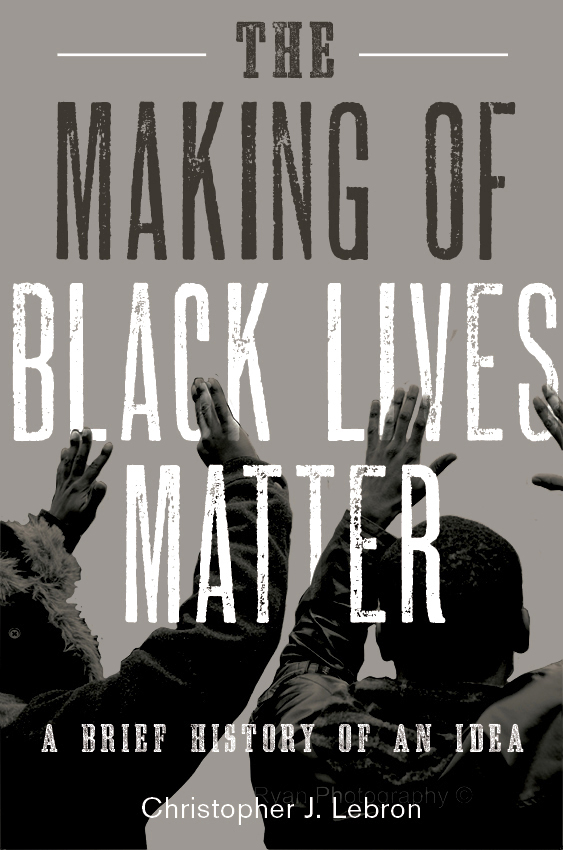The Making of Black Lives Matter: A New Book on the Movement’s History
This post is part of my blog series that announces the publication of selected new books in African American History and African Diaspora Studies. The Making of Black Lives Matter: A Brief History of an Idea was recently published by Oxford University Press.
***
 The author of The Making of Black Lives Matter is Christopher J. Lebron. Lebron is currently assistant professor of African-American Studies and Philosophy at Yale and will be joining Johns Hopkins this summer as associate professor of philosophy. He has written extensively on democratic ethics, social justice, and race. His first book, The Color of Our Shame: Race and Justice In Our Time (Oxford University Press, 2013) won the American Political Science Association Foundations of Political Theory First Book Prize. In addition to his scholarly articles and academic book reviews, Dr. Lebron has also written publicly, most frequently in “The Stone” column for The New York Times as well as for Boston Review and Bill Moyers. He is at work on his third book concerning imagination and racial equality. Follow him on Twitter @lebron_chris.
The author of The Making of Black Lives Matter is Christopher J. Lebron. Lebron is currently assistant professor of African-American Studies and Philosophy at Yale and will be joining Johns Hopkins this summer as associate professor of philosophy. He has written extensively on democratic ethics, social justice, and race. His first book, The Color of Our Shame: Race and Justice In Our Time (Oxford University Press, 2013) won the American Political Science Association Foundations of Political Theory First Book Prize. In addition to his scholarly articles and academic book reviews, Dr. Lebron has also written publicly, most frequently in “The Stone” column for The New York Times as well as for Boston Review and Bill Moyers. He is at work on his third book concerning imagination and racial equality. Follow him on Twitter @lebron_chris.

Started in the wake of George Zimmerman’s 2013 acquittal in the death of Trayvon Martin, the #BlackLivesMatter movement has become a powerful and uncompromising campaign demanding redress for the brutal and unjustified treatment of black bodies by law enforcement in the United States. The movement is only a few years old, but as Christopher J. Lebron argues in this book, the sentiment behind it is not; the plea and demand that “Black Lives Matter” comes out of a much older and richer tradition arguing for the equal dignity — and not just equal rights — of black people.
The Making of Black Lives Matter presents a condensed and accessible intellectual history that traces the genesis of the ideas that have built into the #BlackLivesMatter movement. Drawing on the work of revolutionary black public intellectuals, including Frederick Douglass, Ida B. Wells, Langston Hughes, Zora Neal Hurston, Anna Julia Cooper, Audre Lorde, James Baldwin, and Martin Luther King Jr., Lebron clarifies what it means to assert that “Black Lives Matter” when faced with contemporary instances of anti-black law enforcement. He also illuminates the crucial difference between the problem signaled by the social media hashtag and how we think that we ought to address the problem. As Lebron states, police body cameras, or even the exhortation for civil rights, mean nothing in the absence of equality and dignity. To upset dominant practices of abuse, oppression, and disregard, we must reach instead for radical sensibility. Radical sensibility requires that we become cognizant of the history of black thought and activism in order to make sense of the emotions, demands, and argument of present-day activists and public thinkers. Only in this way can we truly embrace and pursue the idea of racial progress in America.
Injecting historical and philosophical perspective into the country’s contemporary racial quagmire, Lebron offers readers a glimpse of the intellectual roots of African American’s continual fight for respect and equality. His call to join a historically momentous generational force demanding change also offers readers direction on how to become part of a solution.”—Library Journal
Ibram X. Kendi: What are the principal arguments of your book? What do you hope readers take away from reading it?
Christopher J. Lebron: The Making of Black Lives Matter: A Brief History of an Idea provides a point of entry for those curious about the ethical meaning and origin of those three words, “black lives matter.” I invite readers to meet, engage, and re-engage a select number of black theorists and writers who each, in his or her own way, anticipated the current movement for black lives. Frederick Douglass, Ida B. Wells, Langston Hughes, Zora Neale Hurston, Anna Julia Cooper, Audre Lorde, James Baldwin, and Martin Luther King, Jr. each were concerned to articulate for the American public ethical principles demanding that black Americans be treated with dignity and respect.
After engaging each of these eight predecessors to the movement, I suggest that we can take away from their combined lesson a refreshed black radical politics that involves the use of shame to alert Americans to their moral failing; the use of art to ignite in Americans a re-imagining of black humanity; a conception of uncompromising self-possession as protection against the vagaries of racial equality and marginalization; and, finally, a kind of love that at once supports militant resistance to marginalization as well as democratic largeness of heart to help Americans work through the most harmful of their racial biases and beliefs.
Copyright © AAIHS. May not be reprinted without permission.